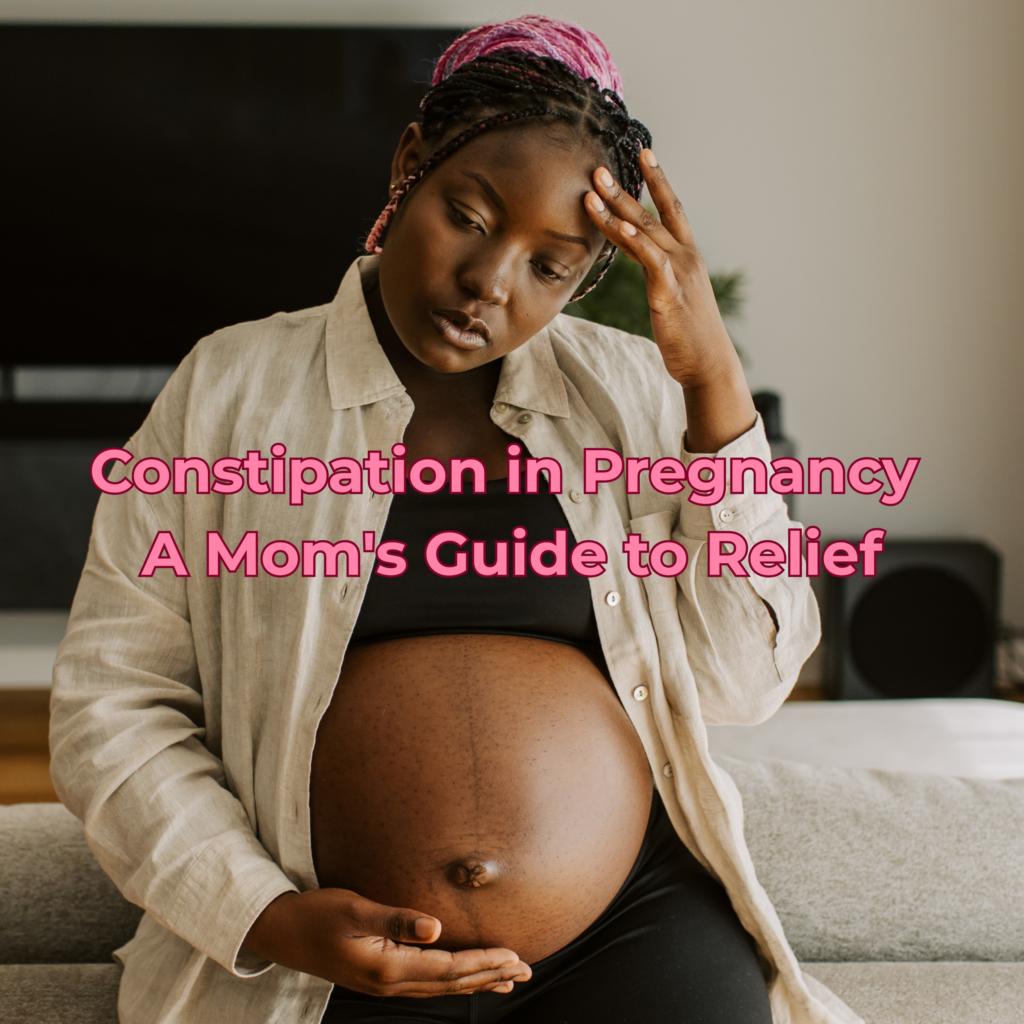
One topic that often comes up in conversations with other moms is constipation. I hear it said all the time that constipation is a normal part of pregnancy. While I can understand why it might feel that way, I firmly believe that just because something is common doesn’t mean it should be accepted as normal.
Hey there, fellow moms and moms-to-be! As a mother of three and currently pregnant with my fourth little miracle, I’ve had my fair share of experiences during pregnancy.
Throughout my pregnancies, I’ve managed to steer clear of constipation by being proactive. I want to share my journey with you and provide helpful solutions if you’re currently struggling with this uncomfortable issue.
Constipation should not be ignored, and there are effective ways to prevent it. So, grab a comfy seat, a glass of water, and let’s dive into the world of pregnancy!
Causes of Constipation in Pregnancy
Understanding the causes of constipation during pregnancy can empower you to take action. Here are some common culprits:
1. High Levels of Progesterone: This hormone, which increases in pregnancy, relaxes smooth muscles, including those in the digestive tract. This relaxation can slow down digestion and lead to constipation. You might feel more sluggish overall due to hormone fluctuations, making everything feel a bit more challenging.
2. Iron Supplements: Many expectant mothers are prescribed iron supplements to prevent anemia, especially during the second and third trimesters. Unfortunately, iron pills are notorious for causing constipation. If you find yourself in this situation, consult with your healthcare provider about switching to liquid iron supplements, which may be easier on your digestive system.
3. Medications: If you’ve had a cesarean section or received postpartum narcotics for pain relief, these medications can also lead to constipation. Always communicate with your doctor about any concerns regarding medication side effects.
4. Caffeine Consumption: While a little caffeine can be safe during pregnancy, excessive intake can dehydrate you, contributing to constipation. If you love your morning coffee or tea, consider moderating your intake and replacing it with herbal teas that are safe for pregnancy.
5. Laxative Use: Frequent use of laxatives can disrupt your body’s natural ability to regulate bowel movements. If you’ve relied on them in the past, it’s time to explore alternative solutions.
6. Low Fiber Intake: A diet lacking in fiber can make it difficult for your body to move food through your digestive system. Many women find that their eating habits change during pregnancy, and this can lead to a decreased fiber intake.
7. Inadequate Hydration: Not drinking enough water can lead to hard stools and exacerbate constipation. Staying hydrated is crucial, especially when your body is working hard to support a growing baby.
Prevention: Take Charge of Your Digestive Health
Now that we know the causes, let’s explore how you can prevent constipation during pregnancy with some tried-and-true methods:
1. Stay Hydrated: Aim to drink plenty of water every day—at least 8-10 glasses. If plain water isn’t your favorite, try spicing it up! You can infuse your water with fruits like lemon, berries, or cucumber for a refreshing twist.
Electrolyte drinks can also be a great option, especially if you’re feeling a bit dehydrated. Herbal teas—such as ginger or peppermint—can also provide additional benefits for digestion. I love sipping on ginger tea for its soothing effects!
2. Probiotics: Incorporating quality probiotics into your routine can help maintain a healthy gut flora. Probiotics are beneficial bacteria that can aid in digestion and help prevent constipation.
You can find them in supplements, and I highly recommend checking out my favorite probiotics በዚህ ሊንክ. If you’re unsure which ones to choose, look for a high-quality brand that contains multiple strains of bacteria for maximum benefit.
3. Fermented Foods: Foods like sauerkraut, kimchi, and fermented salsas are not only delicious but also packed with probiotics. Adding these to your meals can boost your digestive health and keep things moving smoothly.
I’ve made it a habit to include fermented foods in my diet—whether it’s a side of sauerkraut with dinner or a dollop of salsa in my lunch. They add a zing of flavor and a wealth of health benefits!
4. Fiber-Rich Foods: Increasing your fiber intake is one of the most effective ways to prevent constipation. Focus on consuming whole grains, fruits, vegetables, and legumes. Foods like prunes, pineapples, pears, papaya, apples, and flaxseed are particularly effective.
In the Habesha community, flaxseed is a well-known remedy; my grandma swears by it! I like to add ground flaxseed to smoothies, oatmeal, or even to my homemade granola. It’s an easy way to boost fiber without even thinking about it.
5. Don’t Hold It In: If you feel the urge to go, don’t wait! Holding it in can lead to harder stools, making it more difficult to pass. The longer feces sit in the colon, the more water is reabsorbed, worsening constipation. Make it a priority to listen to your body and respond promptly.
6. Exercise: Gentle exercise, such as walking, can stimulate your digestive system and help with nutrient absorption. It doesn’t have to be intense—just a brisk walk can make a difference! I’ve found that being active not only helps my digestion but also lifts my mood during pregnancy.
7. Stress Management: Pregnancy can be an emotional rollercoaster, and stress can exacerbate digestive issues. Consider practicing relaxation techniques such as deep breathing, prenatal yoga, or meditation to help ease tension in your body. Finding a few moments each day to unwind can work wonders for your overall well-being.
Solutions if Constipation Strikes
Even with the best prevention strategies, constipation can still happen. If you find yourself in this uncomfortable situation, here are some solutions to consider:
1. Dietary Adjustments: Increase your fiber intake by incorporating whole grains, fruits, vegetables, and legumes into your meals. Foods like prunes, pineapple, and flaxseed are known for their natural laxative effects.
If you’re struggling, try starting your day with a fiber-rich breakfast—oatmeal topped with flaxseed and berries is a favorite of mine!
2. Gentle Laxatives: If necessary, consult with your healthcare provider about safe laxatives to use during pregnancy.
Some laxative pills are not recommended for the treatment of constipation during pregnancy because they might stimulate uterine contractions and cause dehydration.
3. Warm Beverages: Drinking warm liquids, especially in the morning, can help stimulate bowel movements. A cup of warm lemon water or even bone broth can be particularly effective.
Bone broth is not only nutritious but can also help soothe your digestive system. I often sip on bone broth when I’m feeling sluggish—it feels comforting and nourishing.
4. Relaxation Techniques: Stress can exacerbate digestive issues. Consider practicing relaxation techniques such as deep breathing, prenatal yoga, or meditation to help ease tension in your body. I’ve found that even a few minutes of deep breathing can make a noticeable difference in how I feel.
5. Contact your Health Care Provider: If constipation persists or becomes severe, it’s essential to talk to your healthcare provider. They can evaluate your situation and recommend suitable solutions tailored to your needs. Remember, it’s completely normal to seek help when you need it!
Research and Resources for Constipation in Pregnancy
For those interested in delving deeper into this topic, here are some studies and resources that provide additional insights on constipation during pregnancy:
– The American Pregnancy Association has resources on managing constipation during pregnancy.
– A study published in the National Library of Medicine probiotics combination effectively improves constipation in pregnancy by modifying the gut microbiota composition.
Constipation during pregnancy can be uncomfortable, but it doesn’t have to be a part of your journey. By understanding the causes and taking proactive steps to prevent it, you can enjoy a smoother pregnancy experience. Remember to stay hydrated, eat well, and keep moving!
And if you do find yourself dealing with constipation, there are effective solutions available.
Now, I want to hear from you! Have you experienced constipation during pregnancy? What strategies have worked for you? Share your thoughts and tips in the comments below. Let’s support each other in this beautiful journey of motherhood!


 Understanding Speech Delays in Bilingual Kids: An Immigrant Mom’s Perspective
Understanding Speech Delays in Bilingual Kids: An Immigrant Mom’s Perspective
Leave a Reply